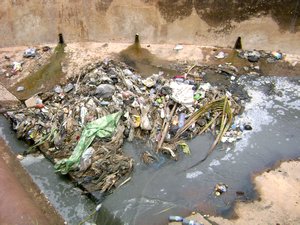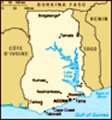Advertisement
Published: July 24th 2010

 a trashy canal
a trashy canal
this isn't the one I wrote about, and it's smaller with less water. But you get the idea.Concrete canals and gutters criss cross all over Ghana. Yesterday, I looked upstream while walking over the wood planks that served as a canal bridge. An evergreen-colored wave carrying trash and waste from the living sloppily made its way to my bridge; I quickly made my way over it, holding my breath as long as I could. I shouldn’t have bothered. I could taste the putrid odor way past the sludge because what sloshes around in the canal works its way into the gutters that line every street. Thankfully, there is also a lot of trash that is burned --- you smell it at dusk when the mosquitoes come out.
The people of Ghana are very clean --- their streets and alleyways not so much. I’m sharing this because while there is so much beauty and humility here there is also horror. I may have seen glimpses of paradise, but it is not all Eden. In fact for some it is very much a hell.
We came here to study the effects of slavery --- past and present. Slavery is illegal in every corner of the world, but it is certainly not extinct. Before coming here I read a

 Mr. Annan
Mr. Annan
Not the best picture, but it's all that I have of him. Rosie is asking some pre-interview questions.book that claimed there are more slaves living and working today than during any other era in history.
I also learned that in Ghana words hold power. Chiefs have spokespeople for them because the words that people hear them say become law, so it is good to have someone to whisper them to before making a proclamation you might regret. I think the power of words holds true in every culture. Human trafficking, while also illegal, sounds more doable than outright slavery, no? Indentured servitude or migrant workers has a softer edge to it since people ‘choose’ these positions. It’s a way to earn a living, so why enforce trafficking laws --- especially if you get a little bit of a dash (tip) for helping out the ‘employers.’
So, when you conduct interviews about modern slavery it gets a little wishy washy because you find yourself discussing the semantics of human trafficking, human smuggling, human exploitation, and children working off family debts.
That wasn’t the case when we talked to James Kofi Annan, Executive Director of Challenging Heights, an NGO that works to rescue, rehabilitate and support child workers in the Volta region, one of the hardest

 The Viper
The Viper
this is the snake we ran into on our hike. Imagine having something like this on your neck?hit areas for domestic child enslavement.
As one of 12 children, Annan was sold at the age of six to work with fishermen.
Children are leased out for a few years to help poor families feed what kids they have left. Some of them come back home, if they survive, when the contract is up. Most end up being enlisted for more years because poverty does not seem to escape the poor. And then it’s too late for kids to come back home because their bosses are good at manipulation and torture. The kids are so young when they are bought, so their owners claim them as their own children --- giving them their names, which makes it all look nice and legal should the police decide to check records. After awhile the children forget who or even what they are.
“You don’t have a voice,” said Annan, besides the young would never defy an elder by speaking up and complaining.
The real parents think their children are just working hard, while being fed and housed.
They don’t know that when a child passes out from exhaustion, a wound or shock he is revived with pepper

 Shopping
Shopping
Just to end on a cheery note --- Venita making friends at the dress shop. Regardless of poverty, tragedy, any horrors you can think of, there is ALWAYS someone to chat and laugh with --- if you're not enslaved.spray and ordered to go back to work. They don’t know that many, because they are small, are asked to dive deep to untangle nets only to find themselves trapped and drowned. They don’t know that when a storm sets in the children are not allowed to stop working. Many of them cling to tree stumps until the storm passes, while deadly snakes and ‘bad fish’ toy with them, sometimes ripping a child apart or crushing him to death. They don’t know that sometimes a child looks real good to Master in bed.
They don’t know that there is no real medical care. When a child worker is wounded, if it is not an obviously fatal wound, the child is brought to a fetish priest, who may truly be concerned about the child and work his or her magic, or who may be a whack job (like some of the ones we have in the states) and concoct cures that will earn cedis for the priest and horrible pain (death if they’re lucky) for the child.
One day Annan picked up a stack of bush (I think for firewood) and threw it on his head, not knowing that he inadvertently just wrapped a poisonous snake around his shoulders. It attached its fangs to his thigh while using the rest of its body to strangle him. Other boys helped wrestle the snake off of him, but not in time to prevent the venom from pumping into his body. When their owner saw Annan writhing in pain, he beat him ordering him to get back to work.
I don’t know how this was decided, but somehow Annan was taken to a fetish priest, where he stayed for three months --- in and out of consciousness. He kept telling himself that he would not die, while also praying (apparently he also had a good priest). He attributes his survival to God, which also meant he had a responsibility to his people, in this case the other child workers.
After a few unsuccessful escape attempts (which we cannot even imagine the brutal punishment that brought on), he managed to get away. Going back home was not easy because you see he now disobeyed and dishonored his father by breaking the work contract. Remember, parents did not know the reality of their children’s lives. Why his father didn’t believe him after seeing the scars is beyond me, but I do not live in a world where selling your children is the better option to keeping them. I starve because I’m on a diet not because there is no money or resources for me to tap into. My children have never known true hunger. I do not know what I would do if I were in Annan’s parents position.
Somehow he managed to keep his freedom and get his way into school. At the age of 13 he began his first classes --- being way, way, way behind the other students. He managed to catch up and be the only person in his family to earn a college degree, eventually working for Barclay Bank, until he could afford to start up Challenging Heights.
He said while rescuing and rehabilitating child workers takes up much of their resources, prevention is his main mission. Education --- for the parents, for law enforcement, for law makers, for the children --- is still key.
“School itself must not serve as a catalyst for enslavement,” he said, “We need to strengthen the quality of education so that children don’t drop out.” He also implied so that parents don’t feel the need to lease out their offspring.
The effects of enslavement go beyond the pain and abuse suffered by the workers. It works its way into the future. “After all of my education, all of my successes, I still wonder what I did wrong to deserve this,” he said. There is also guilt for those who lost the will to live, or for those who lost their humanity. He said he struggles with the flaws within his own culture --- the contradictions of putting family first, and selling family to survive.
There has been a lot of good work done by the government and organizations that work to end child slavery, but there is still sometimes push back from those who use child workers.
Annan has received death threats, but says he does not worry --- not because they aren’t legitimate threats, but because “I have nothing to lose. I’ve lost it all as a child.”
But, he added that the pain of life and successfully coming out of his nightmare is his responsibility to share. The more he tells his story, the more ears and eyes he opens, the more children and their communities are saved.
He also added that this fight (and he does believe this form of slavery will end within 20 years) continues to help him move on for himself.
“The more I do this work the more I feel healed.”
Advertisement
Tot: 0.14s; Tpl: 0.015s; cc: 8; qc: 51; dbt: 0.0537s; 1; m:domysql w:travelblog (10.17.0.13); sld: 1;
; mem: 1.2mb









Badgette
Bettina Tison Bennett
not enough time
to do this story justice, and I wish I could have gotten some statistics to post, but I'll share that with anyone when I get home. There's always so much to catch my attention before I leave here.